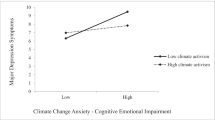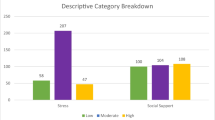Abstract
First-generation youth experience significant levels of intercultural contact through the educational system which may result in acculturative stress and distress that impedes acculturating youth’s development and requires further understanding of the factors that contribute to their resilience. The current study examines (N = 56) psychological and social well-being in relation to emotion regulation in the context of acculturation for youth. Results indicate that positive relationships with others, purpose in life, and environmental mastery relate to higher levels of emotion regulation. Moreover, youth attempting to maintain high levels of both cultures reported lower levels of emotion regulation indicating a conditional relationship with acculturation.

Similar content being viewed by others
References
Archuleta, A. J. (2012). Hispanic Acculturation Index: Advancing measurement in acculturation. Journal of Human Behavior in the Social Environment, 22(3), 297–318.
Archuleta, A. J., & Teasley, M. (2013). Acculturative stress among People of Mexican descent: The role of acculturation, social capital, and family role expectations. Social Work in Mental Health, 11(4), 311–333.
Beauvais, F., & Oetting, E. R. (2000). Orthogonal cultural identification scale. In K. Corcoran & J. Fischer (Eds.), Measure for clinical practice: A sourcebook (3rd ed., Vol. 2, pp. 535–538). New York, NY: The Free Press.
Berry, J. W. (2006a). Contexts of acculturation. In D. L. Sam & J. W. Berry (Eds.), The Cambridge handbook of acculturation psychology (pp. 11–26). New York: Cambridge University Press.
Berry, J. W. (2006b). Stress perspectives on acculturation. In D. L. Sam & J. W. Berry (Eds.), The Cambridge handbook of acculturation psychology (pp. 43–57). New York: Cambridge University Press.
Bronfenbrenner, U. (1979). The ecology of human development. Cambridge, MA: Harvard University Press.
Bronfenbrenner, U. (1988). Interacting systems in human development. Research paradigms: present and future. In N. Bolger, A. Caspi, G. Downey, & M. Moorehouse (Eds.), Persons in context: Developmental perspectives (pp. 25–49). New York: Cambridge University Press.
Brown, A., & Patten, E. (2013a). Hispanics of Cuban origin in the United States, 2011. Washington, DC: Pew Hispanic Center.
Brown, A., & Patten, E. (2013b). Hispanics of Mexican origin in the United States, 2011. Washington, DC: Pew Hispanic Center.
Brown, A., & Patten, E. (2013c). Hispanics of Puerto Rican origin in the United States, 2011. Washington, DC: Pew Hispanic Center.
Brown, A., & Patten, E. (2013d). Hispanics of Guatemalan origin in the United States, 2011. Washington, DC: Pew Hispanic Center.
Chang, D. F., & Sue, S. (2003). The effects of race and problem type on teachers' assessments of student behavior. Journal of Consulting and Clinical Psychology, 71(2), 235–242.
Durlak, J. A., Weissberg, R. P., Dymnicki, A. B., Taylor, R. D., & Schellinger, K. B. (2011). The impact of enhancing student’s social and emotional learning: A meta-analysis of school-based universal interventions. Child Development, 82(1), 405–432.
Folkman, S. (2008). The case for positive emotions in the stress process. Anxiety, Stress, & Coping, 21(1), 3–14.
Fry, R., & Passel, J. S. (2009). Latino children: A majority are U.S.-Born offspring of immigrants. Washington, DC: Pew Hispanic Center.
Garner, P. W., Mahatmya, D., Brown, E. L., & Vesely, C. K. (2014). Promoting desirable outcomes among culturally and ethnically diverse children in social emotional learning programs: A multilevel heuristic model. Educational Psychology Review, 26, 165–189.
Gonzales, N. A., Fabrett, F. C., & Knight, G. P. (2010). Acculturation, enculturation, and the psychosocial adaptation of Latino Youth. In F. A. Villarruel, G. Carlo, J. M. Grau, M. Azmitia, N. J. Cabrera, & T. J. Chahin (Eds.), Handbook of U.S. Latino psychology. Thousand Oaks, CA: Sage Publications Inc.
Gross, J. J., & John, O. P. (2000). Individual difference in two emotion regulation processes: Implication for affect, relationship, and well-being. Journal of Personality and Social Psychology, 85(2), 348–362.
Gross, J. J., & Thompson, R. A. (2009). Emotion regulation: Conceptual foundations. In J. J. Gross (Ed.), Handbook of emotion regulation (pp. 3–26). New York: Guilford Press.
Hayes, A. F. (2013). Introduction to mediation, moderation, and conditional process analysis: A regression based approach. New York: Guilford Press.
Hayes, A. F., & Matthes, J. (2009). Computational procedures for probing interactions in OLS and logistic regression: SPSS and SAS implementation. Behavior Research Methods, 41(3), 924–936.
Kerr, M., Beck, K., Downs, S., Kattar, T., & Uriburu, D. (2003). Family involvement problem and prosocial behavior outcomes of Latino youth. American Journal of Health Behavior, 27(Supplement 1), 55–65.
Keyes, C. L. M. (1998). Social well-being. Social Psychology Quarterly, 61(2), 121–140.
Keyes, C. L. M., Shmotkin, D., & Ryff, C. D. (2002). Optimizing well-being: The empirical encounter of two traditions. Journal of Personality and Social Psychology, 82(6), 1007–1022.
Khanlou, N., & Wray, R. (2014). A whole community approach toward child and youth resilience promotion: A review of resilience literature. International Journal of Mental Health and Addiction, 12, 64–79.
Kochhar, R., Suro, R., & Tafoya, S. (2005). The New Latino South: The context and consequences of rapid population growth. Washington, DC: Pew Hispanic Center.
Kuperminc, G. P., Wilkins, N. J., Roche, C., & Alvarez-Jimenez, A. (2009). Risk, resilience, and positive development among Latino Youth. In F. A. Villarruel, G. Carlo, J. M. Grau, M. Azmitia, N. J. Cabrera, & T. J. Chahin (Eds.), Handbook of U.S. Latino psychology (pp. 213–233). Thousand Oaks, CA: Sage Publications Inc.
Leahy, R. L., Tirch, D., & Napolitano, L. A. (2009). Emotional regulation in psychotherapy: A practitioner’s guide. New York: Guilford Press.
Lopez, M. H. (2013). Three-fourths of Hispanics say their community needs a leader. Washington, DC: Pew Hispanic Center.
Martin, D. C., & Yankay, J. E. (2013). Office of Immigration Statistics Annual Flow Report: Refugees and Asylees: 2012. Washington, DC: U.S. Government Printing Office.
Masten, A. S. (2001). Ordinary magic: Resilience processes in development. American Psychologist, 56(3), 227–238.
Masten, A. S. (2007). Resilience in developing systems: Progress and promoise as the fourth wave rises. Development and Psychopathology, 19, 921–930.
Oppedal, B. (2006). Development and acculturation. In D. L. Sam & J. W. Berry (Eds.), The Cambridge handbook of acculturation psychology (pp. 97–112). New York: Cambridge University Press.
Oshio, A., Kaneko, H., Nagamine, S., & Nakaya, M. (2003). Construct validity of the Adolescent Resilience Scale. Psychological Reports, 93, 1217–1222.
Oshio, A., Nakaya, M., Kaneko, H., & Nagamine, S. (2002). Development and validation of an Adolescent Resilience Scale. Japanese Journal of Counseling Science, 35, 57–65.
Passel, J. S., Cohen, D., & Lopez, M. H. (2011). Census 2010: 50 million Latinos: Hispanics account for more than half of nation’s growth in past decade. Washington, DC: Pew Hispanic Center.
Pew Hispanic Center of Research. (2006). Cubans in the United States: A profile. Washington, DC: Pew Hispanic Center.
Redfield, R., Linton, R., & Herskovits, M. J. (1936). Memorandum for the study of acculturation. American Anthropologist, 38(1), 149–152.
Rudmin, F. (2009). Constructs, measurements, and models of acculturation and acculturative stress. International Journal of Intercultural Relations, 33, 106–123.
Ryff, C. D. (1989). Happiness is everything, or is it? Explorations on the meaning of psychological wellbeing. Journal of Personality and Social Psychology, 57(6), 1069–1081.
Ryff, C. D. (2013). Eudaimonic well-being and health: Mapping consequences of self-realization. In A. S. Waterman (Ed.), The best within us: Positive psychology perspectives on eudaimonia (pp. 77–98). Washington, DC: American Psychological Association.
Ryff, C. D. (2014). Psychological well-being revisited: Advances in the science and practice of eudaimonia. Psychotherapy and Psychosomatics, 83(1), 10–28.
Ryff, C. D., & Keyes, C. L. M. (1995). The structure of psychological well-being revisited. Journal of Personality and Social Psychology, 69(4), 719–727.
Ryff, C. D., Singer, B., Love, G. D., & Essex, M. J. (1998). Resilience in adulthood and later life: Defining features and dynamic processes. In J. Lomranz (Ed.), Handbook of aging and mental health: An integrative approach (pp. 69–96). New York: Plenum.
Santisteban, D. A., Coatsworth, J. D., Briones, E., Kurtines, W., & Szapocznik, J. (2012). Beyond acculturation: An investigation of the relationship of familism and parenting to behavior problems in Hispanic youth. Family Process, 51(4), 470–482.
Saxe, G. N., Ellis, B. H., & Kaplow, J. B. (2007). Collabroative treatment of traumatized children and teens: The trauma systems therapy approach. New York: Guildford Press.
Schwartz, S. J., Unger, J. B., Zamboanga, B. L., & Szapocznik, J. (2010). Rethinking the concept of acculturation: Implications for theory and research. American Psychologist, 4, 237–251.
Smokowski, P. R., & Bacallao, M. L. (2006). Acculturation and agression in Latino adolescents: A structural model focusing on cultural risk factors and assets. Journal of Abnormal Child Psychology, 34, 659–673.
Thompson, R. A., & Meyer, S. (2007). Socialization of emotion regulation in the family. In J. J. Gross (Ed.), Handbook of emotion regulation (pp. 249–268). New York: Guilford Press.
Thomson, M. D., & Hoffman-Goetz, L. (2009). Defining and measuring acculturation: A systematic review of public health studies with Hispanic populations in the United States. Social Science & Medicine, 69, 983–991.
Trosper, S. E., Buzzella, B. A., Bennett, S. M., & Ehrenreich, J. T. (2009). Emotion regulation in youth with emotional disorder: Implications for a unified treatment approach. Clinical Child and Family Psychological Review, 12, 234–254.
Unger, J. B., Ritt-Olson, A., Wagner, K. D., Soto, D. W., & Baezcoude-Garbanati, L. (2009). Parent-child acculturation patterns and substance use among Hispanic adolescents: A longitudinal analysis. Journal of Primary Prevention, 30, 293–313.
U. S. Census Bureau (2010). American Fact Finder. Hispanic or Latino by type: 2010 Census summary file1 Retrieved September, 19, 2014, from http://factfinder2.census.gov/faces/tableservices/jsf/pages/productview.xhtml?src=CF.
Usher, C. (2006). Social capital and mental health in the urban south, USA: A quantitative study. In K. McKenzie & T. Harpham (Eds.), Social capital and mental health (pp. 109–123). London: Jessica Kingsley.
Zelazo, P. D., & Cunningham, W. A. (2007). Executive function: Mechanisms underlying emotion regulation. In J. J. Gross (Ed.), Handbook of emotion regulation (pp. 3–26). New York: Guilford Press.
Author information
Authors and Affiliations
Corresponding author
Rights and permissions
About this article
Cite this article
Archuleta, A.J. Newcomers: The Contribution of Social and Psychological Well-Being on Emotion Regulation Among First-Generation Acculturating Latino Youth in the Southern United States. Child Adolesc Soc Work J 32, 281–290 (2015). https://doi.org/10.1007/s10560-014-0370-4
Published:
Issue Date:
DOI: https://doi.org/10.1007/s10560-014-0370-4




